From the Tramlines is drawing to a close for another year. Over the past 38 weeks, we have brought you weekly updates from Ireland’s tillage fields from our network of 12 growers.
It’s safe to say that 2021 will be a year to remember for all of the right reasons. While winter crops may have got off to a tricky start in autumn 2020 and came through a tough winter, once conditions settled in the spring there was no looking back.
Most growers enjoyed a good spring, broken only by a few wet weeks in May, followed by a fantastic summer. While there were outbreaks of rust and late-season septoria, most growers agree it was a low disease pressure year.
The harvest was smooth, with settled weather arriving at all the right times. Yields ranged from average to very good and low grain moistures were common.
The high grain and straw prices and the novelty of the new Straw Incorporation Measure made the harvest all the sweeter. An equally settled autumn sowing window followed.
This week we talk to all 12 growers in the programme to get their thoughts on the year. What’s clear from most is that 2021 was one of the best on record. However, what is also clear from all is that 2022 could prove to be one of the most challenging.
Cahir, Tipperary
“You couldn’t but be happy with this year,” says Thomas. With the exception of a wet May, which put pressure on first-cut silage, the weather really played ball for him this year.
He managed to get winter crops sown and established in autumn 2020 in good conditions, which helped them make it through a wet winter.
While the spring was cold and late, winter crops came through it in good shape. Spring crops were sown in very dry conditions. Low disease pressure followed by a very smooth harvest and good yields made it one of his best seasons to date.
“We were happy with prices, everything just seemed to fall into place this year,” Thomas says.
High: Getting three in a row – good yields, weather and prices.
Low: The uncertainty of farm inputs for the coming season.
Naas, Kildare
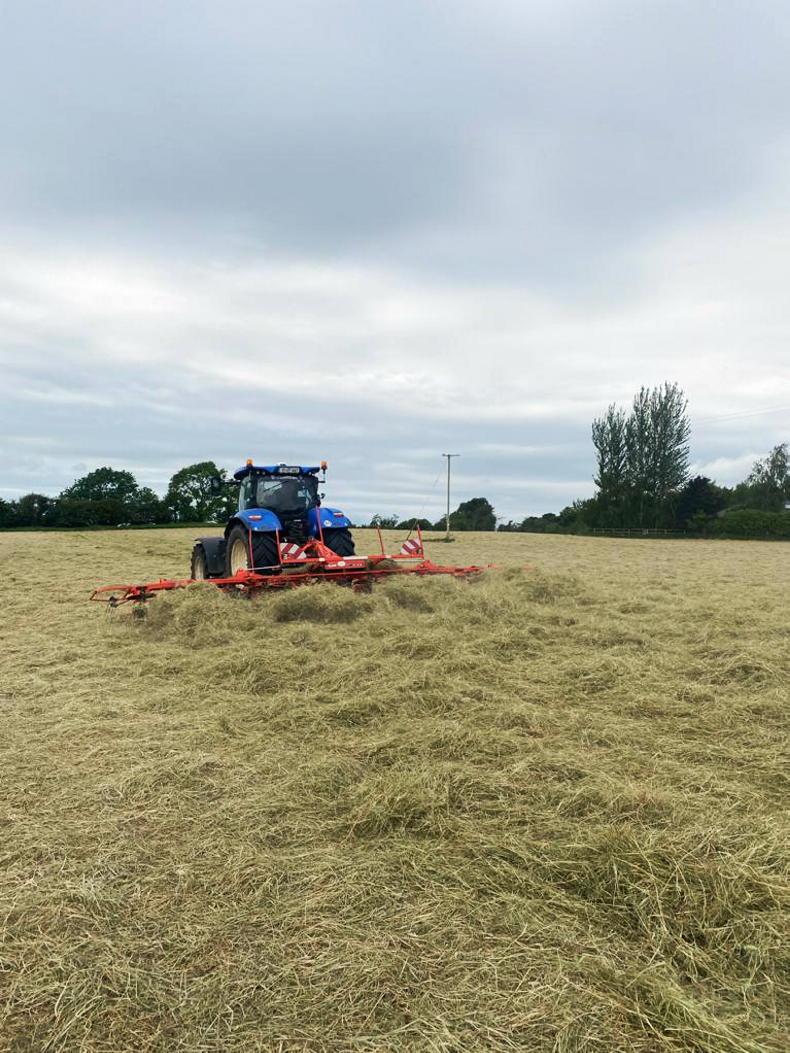
Tim making hay earlier this year.
It was a strange year for Tim. On the farming end of things, it was excellent. After a wet start and a cold spring, the weather settled and he enjoyed a long dry spell. Crops thrived in these conditions, helped by relatively low disease pressure and long growing days. The harvest went well, yields were good and so were prices.
But as readers will be aware, Tim had a serious farm accident involving a bull just before the harvest and suffered significant injuries. Thankfully, after a long recovery period, he is back to full health again.
Winter crops were drilled in great conditions and mild autumn weather meant all crops have established well.
High: The way friends and the community rallied around him and his family following the farm accident.
Low: Having the severe farm accident with months of recovery.
Newtowncunningham, Donegal
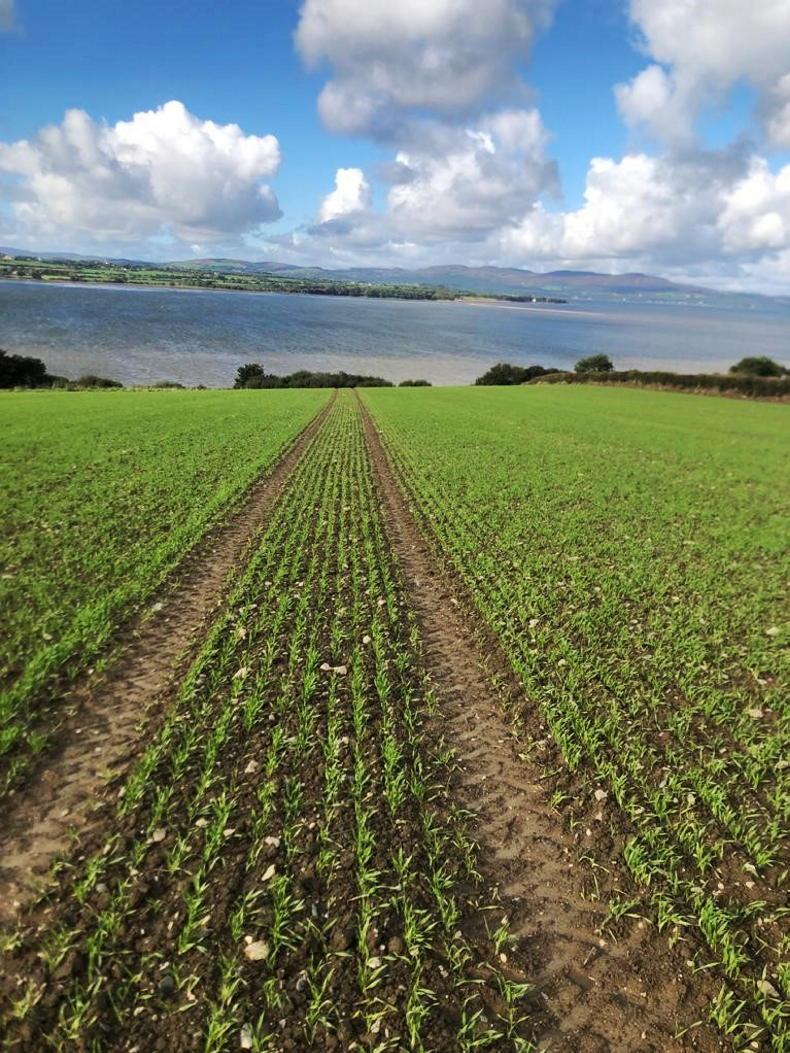
James's winter barley crops got off to a great start.
Overall it was a good year in Donegal, says James. “We had good spells of weather when we really needed it this year,” he says.
He remembers the challenges of autumn sowing in 2020 and compares it to the dream conditions experienced this year. “Winter crops are in great shape this year compared to last, they got a great chance for the season ahead,” he says.
He was very happy with how his winter barley crops performed this year. Average moistures were very low at around 14%. However, he did say that thin patches in fields brought yield averages down. Prices were also excellent, boosted by low moisture bonuses.
James’s winter crops are yellow in places due to a wet October but in general they are looking well.
High: The high pressure which dominated during the winter barley harvest was a high point.
Low: The spring, in particular May, proved to be wet and cold.
Downpatrick,
Down
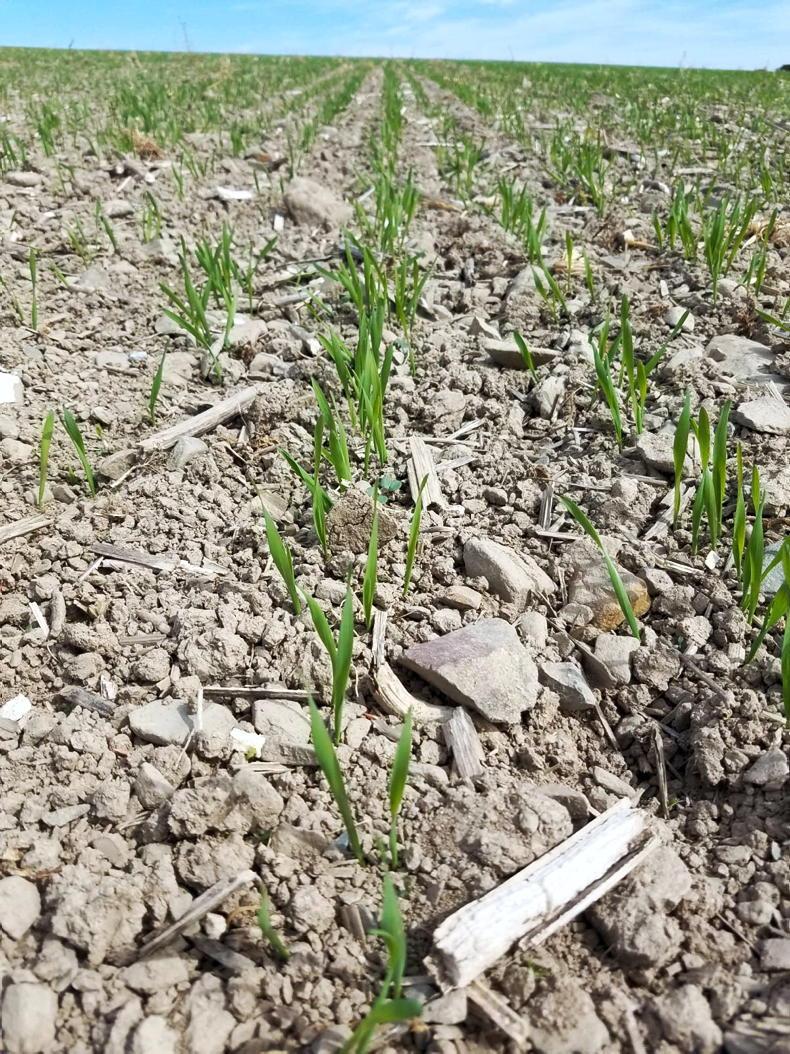
Iain's spring crops emerged into very dry conditions.
The 2021 cropping year kicked off with wet weather, says Iain, and some winter crops went backward as a result. However, things went from too wet to too dry in the spring and this trend continued for much of the remainder of the season.
It proved to be a low disease pressure year and Iain didn’t have to apply a T0 fungicide as a result. Getting fertiliser into the crops was problematic, however. The harvest was staggered at the beginning due to broken weather but when things settled down, his oats, oilseed and wheat were all ripe around the same time. Iain had some mechanical problems with his combine around this time, which proved to be a challenge.
Yields were average but prices were very good. Autumn sowing went smoothly and crops are coming along well.
High: Good prices and easy autumn sowing.
Low: The poor winter of 2020/21 and its impact on crops.
Lixnaw, Kerry
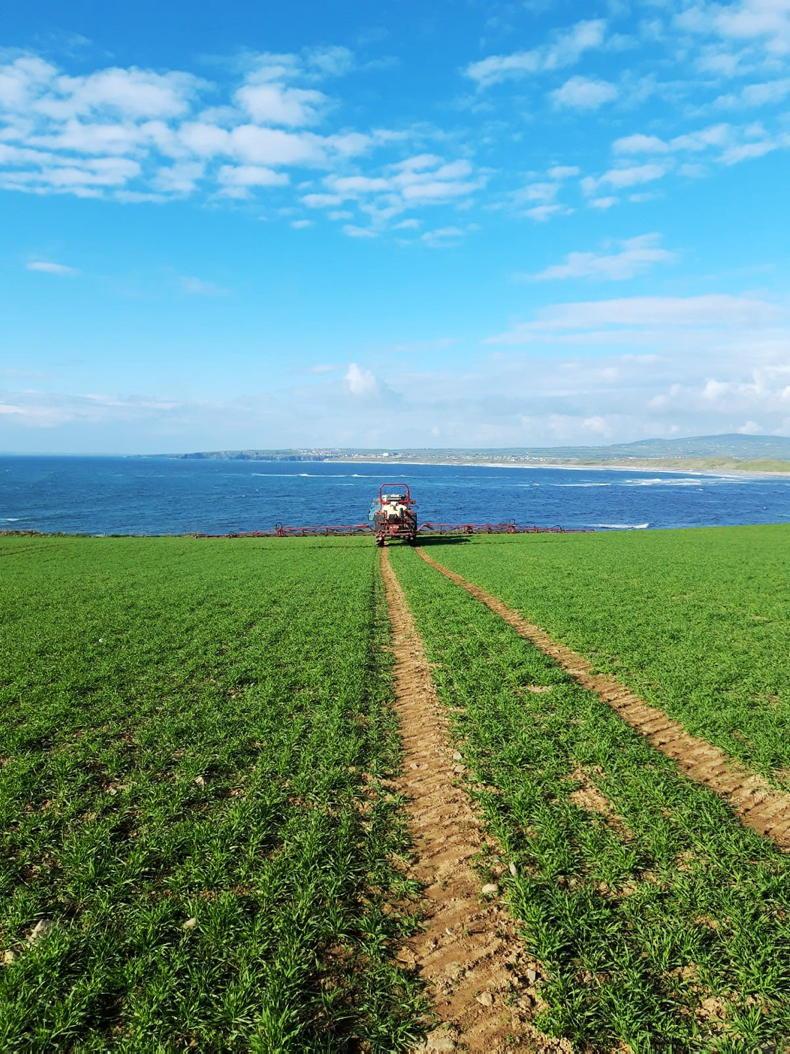
Con spraying his winter wheat in sunny conditions in spring.
“It’s amazing how things change and turn around,” says Con when describing the upturn in grain and commodity prices this year. Overall it has been a good year in north Kerry he explains.
He says most crops, including his hybrid rye, maize and wheat, yielded very well this year but his spring barley was the exception. He questions if a late frost in April contributed to their disappointing performance.
Harvest weather played ball this season but autumn sowing proved to be a challenge due to broken conditions. He had a short window to get crops drilled but they are now all up and looking well.
High: Seeing all the prices of the main agricultural commodities go up.
Low: Not getting to meet his fellow From the Tramlines colleagues at the annual workshop in December. The From the Tramlines workshop was postponed to 2022 due to COVID-19.
Enniscorthy, Wexford
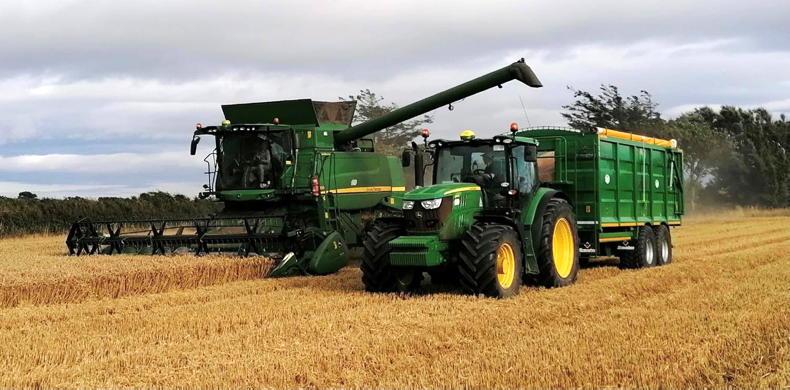
Padraig harvesting spring barley.
“I’ve had one of my best years to date,” says Padraig. “While we didn’t beat any records, we had good yields, prices and weather, so if every year was like that I’d be happy.”
He says winter crops got off to a bad start in 2020 but they came through the winter very well. A cold spring made it challenging to apply growth regulators in particular but conditions remained dry and ground trafficability was good.
The summer proved to be fantastic, with ideal harvest conditions. This continued into autumn.
Padraig says his biggest challenge was establishing winter crops into chopped oat straw due to its impact on nitrogen availability. He intends to tweak this next year by spreading organic manures onto chopped straw.
High: Achieving the three in a row – good harvest weather, prices and yields.
Low: The record high fertiliser prices for next season.
Kilgraigue, Meath
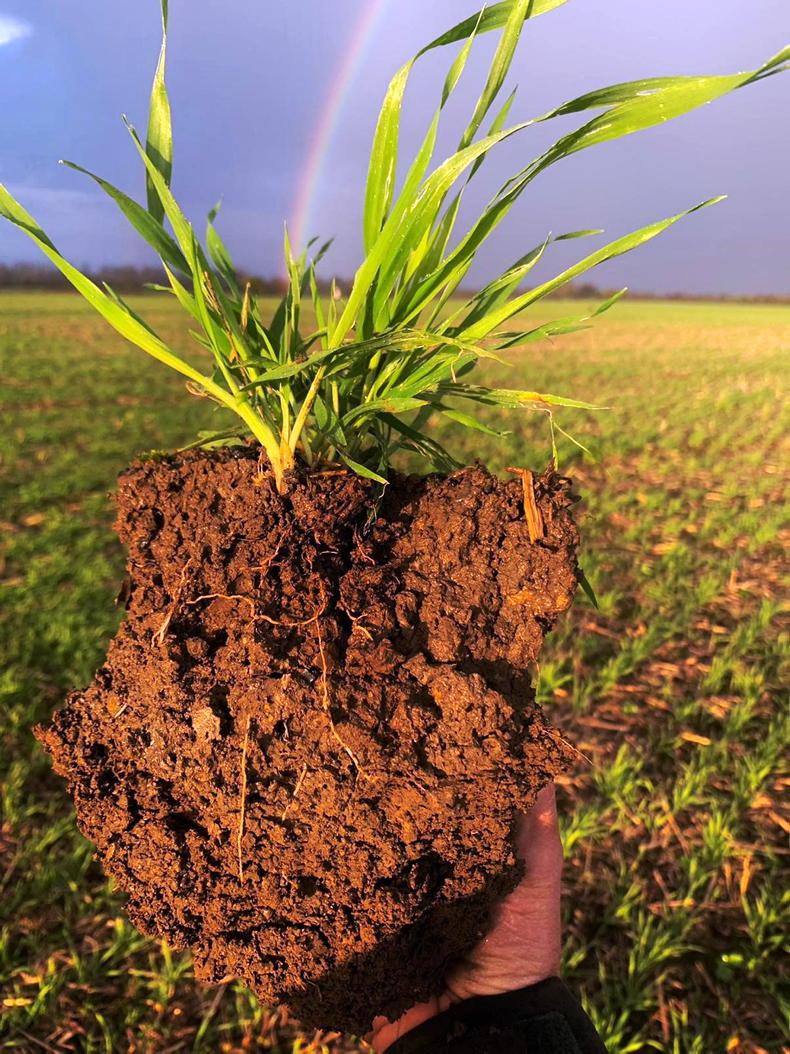
Norman's winter barley has established well.
“You never know how the cards will be dealt in any season, but things fell right this year and I don’t think we’ll see the likes of it again any time soon,” says Norman. “After a cold spring, things pretty much happened the way they are supposed to happen.”
His winter crops were sown early in autumn 2020 and came through the winter in good condition. From late spring into the summer, the weather was fantastic. Norman says disease pressure was low and he applied more fungicide sprays than he could have. The harvest was very easy on man and machine and yields were reasonably good.
Autumn sowing was finished up in three days and he says ground conditions were as good as he’s ever seen them.
High: Winning the Farming for Nature Awards.
Low: Losing his friend Philip Reck earlier in the year.
Mallow, Cork
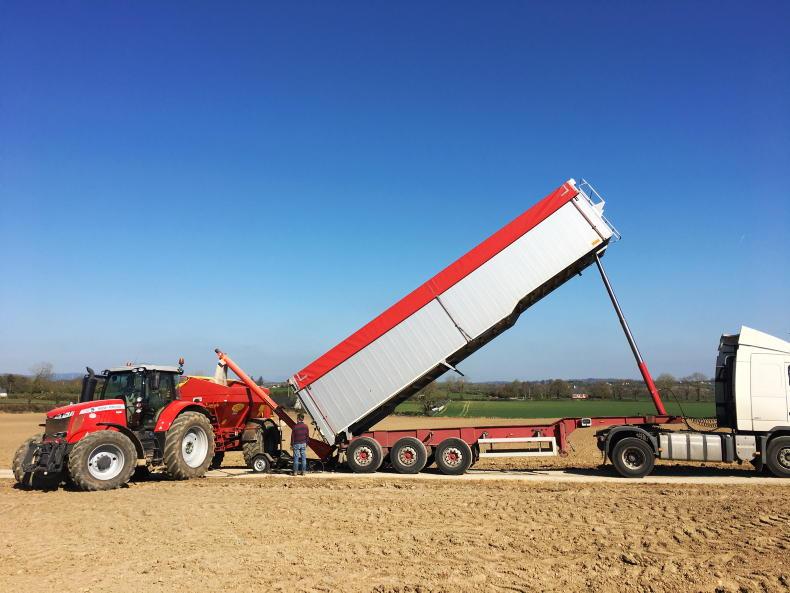
John filling his fertiliser spreader in the spring.
John says 2021 has been one of his best years to date. “Everything just seemed to go right this year,” he says.
Winter crops were drilled in 2020 just before the weather broke. He says that despite a wet winter, the crops entered spring in reasonable shape. John explains that spring conditions proved to be perfect for getting drilling and spraying done. Harvest weather was excellent, particularly for the first week where he cut most of his winter barley. The weather broke in August but settled towards the end of the month.
While John had no bumper grain yields, they all did reasonably well. Gathering straw also proved to be an easy job this year. Autumn sowing went very smoothly and all crops are looking well.
High: This year’s grain prices and reasonable cost of inputs.
Low: The concern that input costs are likely to rise by an average of €90/t next year.
Limavady, Derry

Jonathan trialing a new Lemken Solitair 9 drill in autumn.
“It has been a very good year for everything,” says Jonathan. He says that despite sticky conditions in autumn 2020, he was able to sow everything he had planned.
Crops did look poorly in January and February due to wet conditions but quickly pulled out of it in spring. While the spring was cold, it proved to be very good for getting spring crops planted.
With the exception of a wet May, the growing season was kind. Jonathan’s harvest also went very well. Like most other areas, the weather broke for a period in August but soon settled to ensure a smooth winter wheat and spring crop harvest. All cereal and straw yields were very good this year and he received strong prices.
Autumn drilling was a little more broken but ground conditions and crop establishment was excellent.
High: Combining his wheat in good conditions this year.
Low: His maize yields proved disappointing after looking promising all year.
Athenry, Galway

Michael harvesting potatoes in October.
Michael is very happy with how 2021 went for him. “We’ve never really had as good a year on the cereal side of things,” he says.
Like many areas, however, last year’s winter crops were established in challenging conditions and were thinned by both saturated soils and crows. However, the plants which survived winter recovered well in the spring when dry weather returned.
While April was a dry month, May proved to be the opposite, which meant potato planting was delayed. Good weather remained for the critical periods of the harvest and Michael was happy with how the crops yielded and the prices he received.
The autumn went OK and winter crops were planted and potato crops harvested in reasonable conditions. Michael would like to thank everyone who helped him over the past year.
High: The good grain yields and high prices.
Low: Poor grass growth during a dry June was a challenge.
Adree, Louth
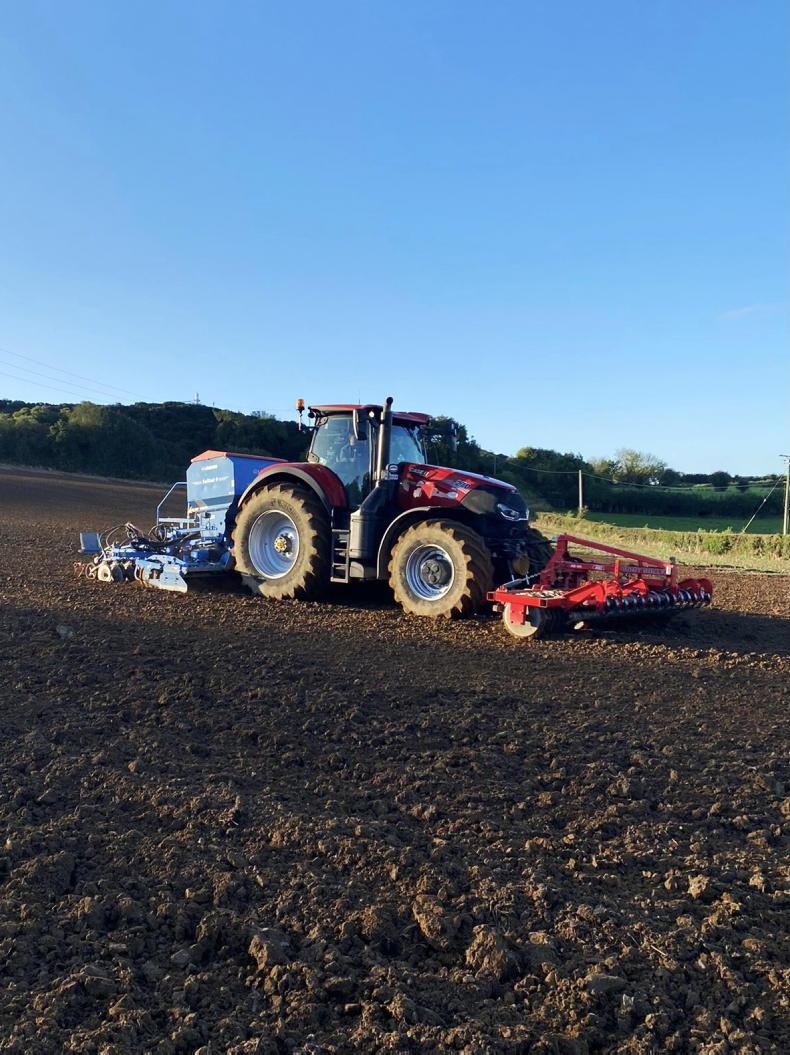
Brendan drilling winter wheat this autumn
“You can’t fault it,” says Brendan when chatting about 2021. While winter crops were drilled in less than ideal conditions in 2020 and suffered from slug damage resulting in thin patches, they recovered very well in spring.
He managed to plant all of his potatoes by the end of April and with the exception of requiring moisture at times, the crop had a smooth growing season.
Brendan’s cereal harvest went well. His six-row hybrid winter barley yields set a farm record and his potato harvest was wrapped up in 11 days. “It was one of those years where you didn’t have to do any work to the potato harvesters before putting them away, it was that easy,” says Brendan.
High: The ease of the cereal and potato harvests.
Low: Issues with virus on his home-saved potatoes.
Durrow, Laois
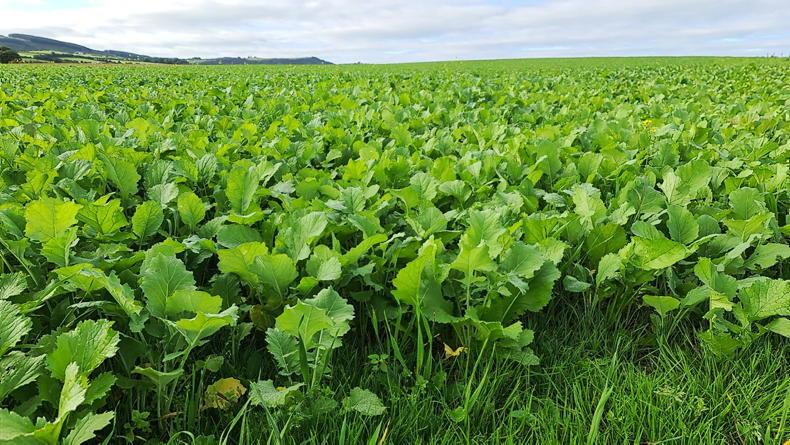
Seamus's forage rape and stubble turnip cover crop grew well this year.
“This year was textbook perfect,” says Seamus. “If you sit down and think about how an ideal season would go, this was it.”
All crops came through last winter in good condition, he explains, and after a slow start this year, there was no looking back. Spring sowing and establishment were perfect, says Seamus, and crops enjoyed a relatively low disease pressure year. “The harvest started off good but we did have some poor weather halfway through but by the time spring corn was ripe, the weather was perfect again.”
He says that grain prices ended up high with relatively good yields.
High: Attending the National Ploughing Championships in Laois this year and watching the competitors in action.
Low: The skyrocketing fertiliser and other input prices for next season.
A word of thanks
From all in the Irish Farmers Journal,
we would like to thank growers for their time and effort in taking part in this year’s series. Thank you also to our series sponsors, Corteva, Gouldings and Sencrop, for their continued support.
From the Tramlines is drawing to a close for another year. Over the past 38 weeks, we have brought you weekly updates from Ireland’s tillage fields from our network of 12 growers.
It’s safe to say that 2021 will be a year to remember for all of the right reasons. While winter crops may have got off to a tricky start in autumn 2020 and came through a tough winter, once conditions settled in the spring there was no looking back.
Most growers enjoyed a good spring, broken only by a few wet weeks in May, followed by a fantastic summer. While there were outbreaks of rust and late-season septoria, most growers agree it was a low disease pressure year.
The harvest was smooth, with settled weather arriving at all the right times. Yields ranged from average to very good and low grain moistures were common.
The high grain and straw prices and the novelty of the new Straw Incorporation Measure made the harvest all the sweeter. An equally settled autumn sowing window followed.
This week we talk to all 12 growers in the programme to get their thoughts on the year. What’s clear from most is that 2021 was one of the best on record. However, what is also clear from all is that 2022 could prove to be one of the most challenging.
Cahir, Tipperary
“You couldn’t but be happy with this year,” says Thomas. With the exception of a wet May, which put pressure on first-cut silage, the weather really played ball for him this year.
He managed to get winter crops sown and established in autumn 2020 in good conditions, which helped them make it through a wet winter.
While the spring was cold and late, winter crops came through it in good shape. Spring crops were sown in very dry conditions. Low disease pressure followed by a very smooth harvest and good yields made it one of his best seasons to date.
“We were happy with prices, everything just seemed to fall into place this year,” Thomas says.
High: Getting three in a row – good yields, weather and prices.
Low: The uncertainty of farm inputs for the coming season.
Naas, Kildare

Tim making hay earlier this year.
It was a strange year for Tim. On the farming end of things, it was excellent. After a wet start and a cold spring, the weather settled and he enjoyed a long dry spell. Crops thrived in these conditions, helped by relatively low disease pressure and long growing days. The harvest went well, yields were good and so were prices.
But as readers will be aware, Tim had a serious farm accident involving a bull just before the harvest and suffered significant injuries. Thankfully, after a long recovery period, he is back to full health again.
Winter crops were drilled in great conditions and mild autumn weather meant all crops have established well.
High: The way friends and the community rallied around him and his family following the farm accident.
Low: Having the severe farm accident with months of recovery.
Newtowncunningham, Donegal

James's winter barley crops got off to a great start.
Overall it was a good year in Donegal, says James. “We had good spells of weather when we really needed it this year,” he says.
He remembers the challenges of autumn sowing in 2020 and compares it to the dream conditions experienced this year. “Winter crops are in great shape this year compared to last, they got a great chance for the season ahead,” he says.
He was very happy with how his winter barley crops performed this year. Average moistures were very low at around 14%. However, he did say that thin patches in fields brought yield averages down. Prices were also excellent, boosted by low moisture bonuses.
James’s winter crops are yellow in places due to a wet October but in general they are looking well.
High: The high pressure which dominated during the winter barley harvest was a high point.
Low: The spring, in particular May, proved to be wet and cold.
Downpatrick,
Down

Iain's spring crops emerged into very dry conditions.
The 2021 cropping year kicked off with wet weather, says Iain, and some winter crops went backward as a result. However, things went from too wet to too dry in the spring and this trend continued for much of the remainder of the season.
It proved to be a low disease pressure year and Iain didn’t have to apply a T0 fungicide as a result. Getting fertiliser into the crops was problematic, however. The harvest was staggered at the beginning due to broken weather but when things settled down, his oats, oilseed and wheat were all ripe around the same time. Iain had some mechanical problems with his combine around this time, which proved to be a challenge.
Yields were average but prices were very good. Autumn sowing went smoothly and crops are coming along well.
High: Good prices and easy autumn sowing.
Low: The poor winter of 2020/21 and its impact on crops.
Lixnaw, Kerry

Con spraying his winter wheat in sunny conditions in spring.
“It’s amazing how things change and turn around,” says Con when describing the upturn in grain and commodity prices this year. Overall it has been a good year in north Kerry he explains.
He says most crops, including his hybrid rye, maize and wheat, yielded very well this year but his spring barley was the exception. He questions if a late frost in April contributed to their disappointing performance.
Harvest weather played ball this season but autumn sowing proved to be a challenge due to broken conditions. He had a short window to get crops drilled but they are now all up and looking well.
High: Seeing all the prices of the main agricultural commodities go up.
Low: Not getting to meet his fellow From the Tramlines colleagues at the annual workshop in December. The From the Tramlines workshop was postponed to 2022 due to COVID-19.
Enniscorthy, Wexford

Padraig harvesting spring barley.
“I’ve had one of my best years to date,” says Padraig. “While we didn’t beat any records, we had good yields, prices and weather, so if every year was like that I’d be happy.”
He says winter crops got off to a bad start in 2020 but they came through the winter very well. A cold spring made it challenging to apply growth regulators in particular but conditions remained dry and ground trafficability was good.
The summer proved to be fantastic, with ideal harvest conditions. This continued into autumn.
Padraig says his biggest challenge was establishing winter crops into chopped oat straw due to its impact on nitrogen availability. He intends to tweak this next year by spreading organic manures onto chopped straw.
High: Achieving the three in a row – good harvest weather, prices and yields.
Low: The record high fertiliser prices for next season.
Kilgraigue, Meath

Norman's winter barley has established well.
“You never know how the cards will be dealt in any season, but things fell right this year and I don’t think we’ll see the likes of it again any time soon,” says Norman. “After a cold spring, things pretty much happened the way they are supposed to happen.”
His winter crops were sown early in autumn 2020 and came through the winter in good condition. From late spring into the summer, the weather was fantastic. Norman says disease pressure was low and he applied more fungicide sprays than he could have. The harvest was very easy on man and machine and yields were reasonably good.
Autumn sowing was finished up in three days and he says ground conditions were as good as he’s ever seen them.
High: Winning the Farming for Nature Awards.
Low: Losing his friend Philip Reck earlier in the year.
Mallow, Cork

John filling his fertiliser spreader in the spring.
John says 2021 has been one of his best years to date. “Everything just seemed to go right this year,” he says.
Winter crops were drilled in 2020 just before the weather broke. He says that despite a wet winter, the crops entered spring in reasonable shape. John explains that spring conditions proved to be perfect for getting drilling and spraying done. Harvest weather was excellent, particularly for the first week where he cut most of his winter barley. The weather broke in August but settled towards the end of the month.
While John had no bumper grain yields, they all did reasonably well. Gathering straw also proved to be an easy job this year. Autumn sowing went very smoothly and all crops are looking well.
High: This year’s grain prices and reasonable cost of inputs.
Low: The concern that input costs are likely to rise by an average of €90/t next year.
Limavady, Derry

Jonathan trialing a new Lemken Solitair 9 drill in autumn.
“It has been a very good year for everything,” says Jonathan. He says that despite sticky conditions in autumn 2020, he was able to sow everything he had planned.
Crops did look poorly in January and February due to wet conditions but quickly pulled out of it in spring. While the spring was cold, it proved to be very good for getting spring crops planted.
With the exception of a wet May, the growing season was kind. Jonathan’s harvest also went very well. Like most other areas, the weather broke for a period in August but soon settled to ensure a smooth winter wheat and spring crop harvest. All cereal and straw yields were very good this year and he received strong prices.
Autumn drilling was a little more broken but ground conditions and crop establishment was excellent.
High: Combining his wheat in good conditions this year.
Low: His maize yields proved disappointing after looking promising all year.
Athenry, Galway

Michael harvesting potatoes in October.
Michael is very happy with how 2021 went for him. “We’ve never really had as good a year on the cereal side of things,” he says.
Like many areas, however, last year’s winter crops were established in challenging conditions and were thinned by both saturated soils and crows. However, the plants which survived winter recovered well in the spring when dry weather returned.
While April was a dry month, May proved to be the opposite, which meant potato planting was delayed. Good weather remained for the critical periods of the harvest and Michael was happy with how the crops yielded and the prices he received.
The autumn went OK and winter crops were planted and potato crops harvested in reasonable conditions. Michael would like to thank everyone who helped him over the past year.
High: The good grain yields and high prices.
Low: Poor grass growth during a dry June was a challenge.
Adree, Louth

Brendan drilling winter wheat this autumn
“You can’t fault it,” says Brendan when chatting about 2021. While winter crops were drilled in less than ideal conditions in 2020 and suffered from slug damage resulting in thin patches, they recovered very well in spring.
He managed to plant all of his potatoes by the end of April and with the exception of requiring moisture at times, the crop had a smooth growing season.
Brendan’s cereal harvest went well. His six-row hybrid winter barley yields set a farm record and his potato harvest was wrapped up in 11 days. “It was one of those years where you didn’t have to do any work to the potato harvesters before putting them away, it was that easy,” says Brendan.
High: The ease of the cereal and potato harvests.
Low: Issues with virus on his home-saved potatoes.
Durrow, Laois

Seamus's forage rape and stubble turnip cover crop grew well this year.
“This year was textbook perfect,” says Seamus. “If you sit down and think about how an ideal season would go, this was it.”
All crops came through last winter in good condition, he explains, and after a slow start this year, there was no looking back. Spring sowing and establishment were perfect, says Seamus, and crops enjoyed a relatively low disease pressure year. “The harvest started off good but we did have some poor weather halfway through but by the time spring corn was ripe, the weather was perfect again.”
He says that grain prices ended up high with relatively good yields.
High: Attending the National Ploughing Championships in Laois this year and watching the competitors in action.
Low: The skyrocketing fertiliser and other input prices for next season.
A word of thanks
From all in the Irish Farmers Journal,
we would like to thank growers for their time and effort in taking part in this year’s series. Thank you also to our series sponsors, Corteva, Gouldings and Sencrop, for their continued support.














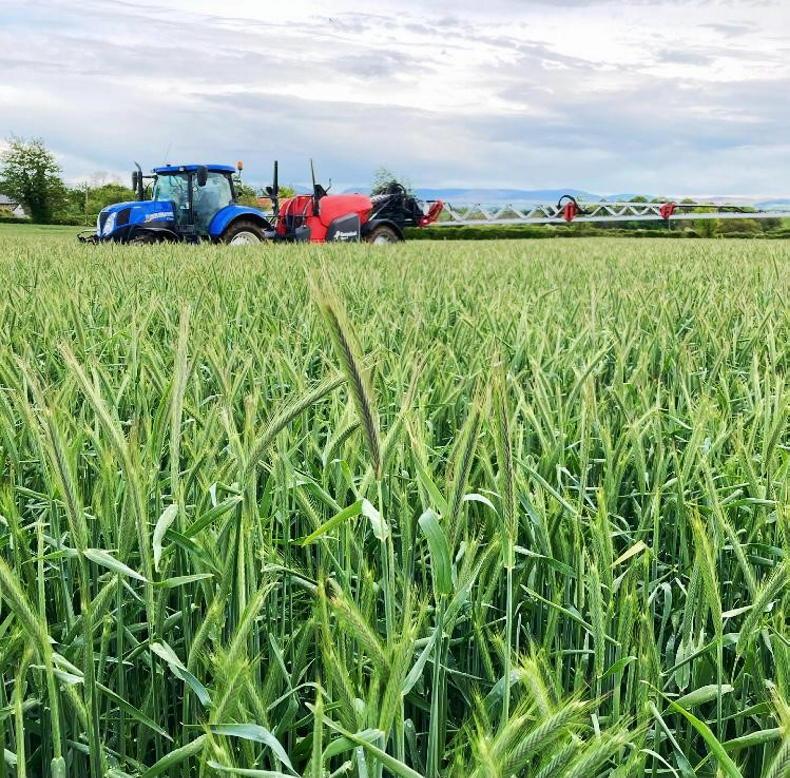

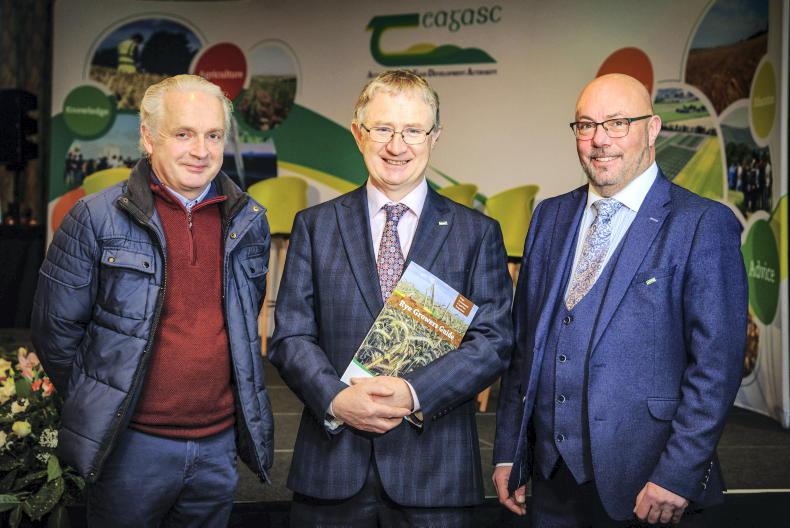

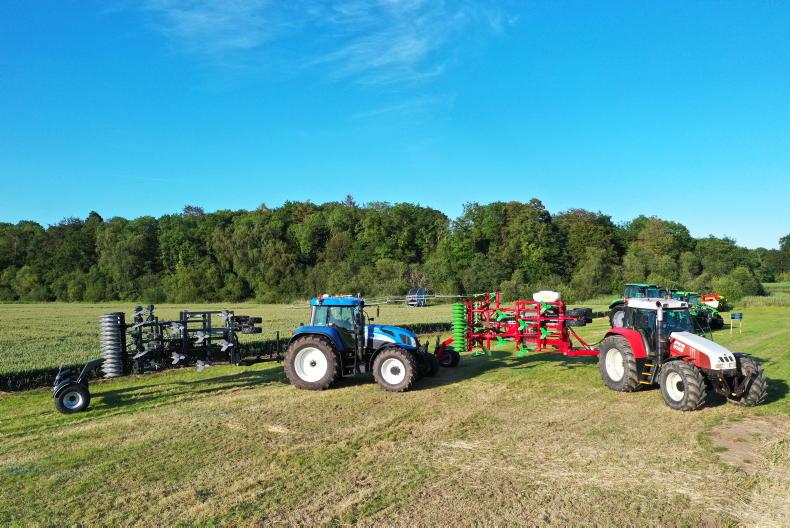
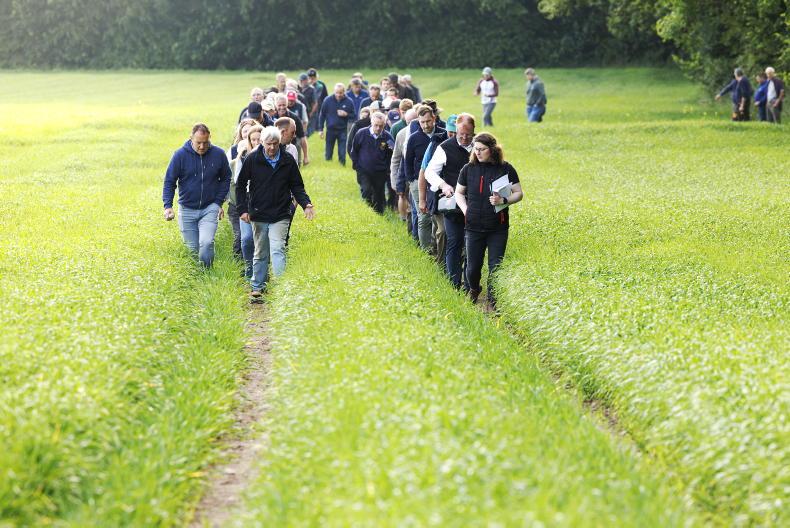

SHARING OPTIONS